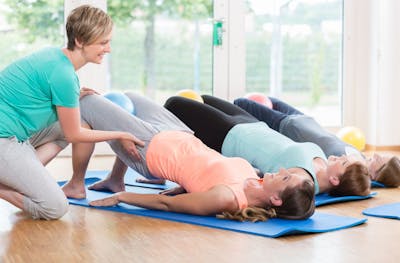Pelvic Health Physiotherapy
What is Pelvic Health Physiotherapy?
Pelvic Health Physiotherapy pertains to the assessment, treatment and prevention of various pelvic health disorders. The pelvic floor consists of muscles, nerves, ligaments, and fascia located at the bottom of the pelvis. These muscles rest like a supportive hammock, spanning from the pubic bone to the tailbone. The pelvic floor is responsible for supporting the internal pelvic organs including the uterus and bladder. When the pelvic floor is working in optimal function the structures allow for bowel and bladder control, pelvic organ support, and pain free sexual functions.
Pelvic Health Dysfunction can contribute to incontinence, difficulties with emptying the bowel and bladder, pelvic organ prolapse, chronic pelvic pain, sexual pain and pregnancy related pain.
 Symptoms You May Experience with Pelvic Health Dysfunction:
Symptoms You May Experience with Pelvic Health Dysfunction:
- Leakage of urine with coughing, sneezing, laughing, and exercise
- Urgency and frequency of sensations of urination greater than 8 times per day
- Inability to hold urine during strong urges, resulting in urine leakage
- Difficulty passing stool
- Difficulty initiating urination
- Feelings of not emptying the bladder fully after urinating
- Pain in the vagina or pelvis relating to sexual intercourse or penetration of the vagina or rectum
- Burning or stinging sensation in the pelvis
- Pelvic pain in the vagina, clitoris, rectum or perineum
- Pain in the tailbone, buttock or pelvic girdle
- Pain and heavy cramping with menstruation
- Heaviness or pressure within the pelvic region
- Protrusion of tissues inside or outside of the vaginal entrance
- Pain in the pelvis after childbirth (tailbone, low back, pubic bone)
- Separation of abdominal wall pre and post childbirth
Conditions Treated by a Trained Pelvic Health Physiotherapist
- Stress Urinary Incontinence
- Urge Urinary Incontinence
- Over Active Bladder
- Pelvic Organ Prolapse (Cystocele, Rectocele, Urethrocele, Uterine Prolapse, Vaginal Vault Prolapse, Entercocele)
- Interstitial Cystitis
- Dyspareunia
- Vestibulodynia/Vulvodynia
- Vaginismus
- Pudendal Neuralgia
- Coccydynia
- Pregnancy related pelvic pain both pre and post-partum
- Diastasis Recti
What Causes Pelvic Health Dysfunction?
Pelvic Health dysfunction can be related to the following:
- Hypotonic Pelvic Health (Weak pelvic health muscles): Can contribute to stress incontinence, urge incontinence and pelvic organ prolapse. Contrary to popular belief Incontinence is NOT a normal part of aging or effect of childbirth.
- Hypertonic Pelvic Health (Tight pelvic health muscles): Can contribute to Urinary and Fecal Urgency, Urge Incontinence, Chronic Pelvic Pain, Dyspareunia, Vaginismus, Vulvodynia, Pudendal Neuralgia, and Interstitial Cystitis.
What To Expect From Your Pelvic Health Physiotherapist:
At your initial consultation your Pelvic Health Physiotherapist will review your history of symptoms. Based on your symptoms your therapist will perform as needed a thorough examination externally evaluating spinal, hip, abdominal, and pelvic mobility and positioning and areas of tissue restriction and tender points. Finally, an internal vaginal/rectal examination is performed to determine whether the pelvic health is weak or tight. The internal evaluation is performed by gently inserting a finger into the vagina and/or rectum and palpating each muscle group to determine its level of function.
Upon completion of the assessment your therapist will discuss with you the results of the assessment and propose a treatment plan. Treatments involve both external and internal techniques and may include the following:
- Pelvic health muscle strengthening/exercises with manual cueing
- Neuromuscular re-education
- Connective tissue mobilisation
- Myofascial release
- Trigger point release
- Neural mobilisation
- Mobilisation of the lumbar spine, hip, coccyx, and sacroiliac joints
- Pelvic health muscles stretching
- Guided relaxation techniques
- Home exercise program
- Education
For more information, Call us at (905) 760-PROS.
 Symptoms You May Experience with Pelvic Health Dysfunction:
Symptoms You May Experience with Pelvic Health Dysfunction:
